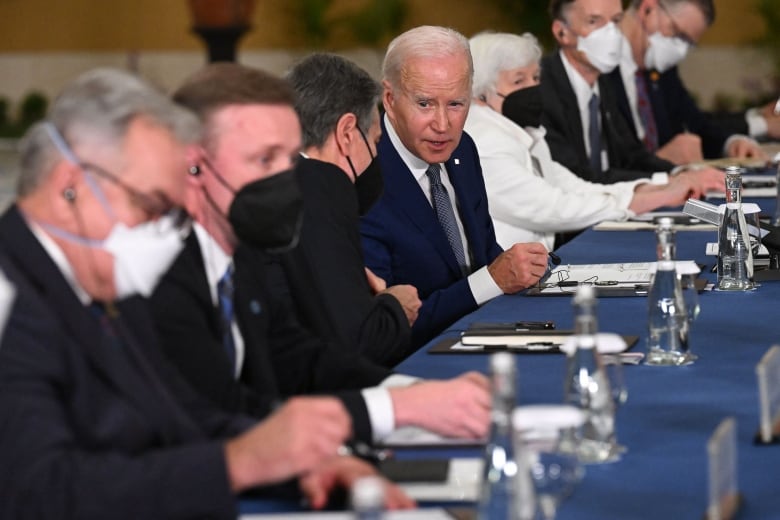
U.S. President Joe Biden and Chinese President Xi Jinping held talks for about three hours on Monday in their first in-person meeting since Biden took office nearly two years ago, aiming to “manage” differences between the superpowers as they compete for global influence amid increasing economic and security tensions.
Xi and Biden greeted each other with a handshake at a luxury resort hotel in Bali, Indonesia, where they are attending the Group of 20 summit of large economies, before they sat down for formal talks.
“As the leaders of our two nations, we share responsibility, in my view, to show that China and the United States can manage our differences, prevent competition from becoming anything ever near conflict and to find ways to work together on urgent global issues that require our mutual co-operation,” Biden said to open the meeting.
Xi called on Biden to “chart the right course” and “elevate the relationship” between China and the U.S. He said he was ready for a “candid and in-depth exchange of views” with Biden.
Highly anticipated encounter
Both men entered the highly anticipated meeting with bolstered political standing at home. Democrats triumphantly held onto control of the U.S. Senate, with a chance to boost their ranks by one in a runoff election in Georgia next month, while Xi was awarded a third five-year term in October by the Communist Party’s national congress, a break with tradition.
“We have very little misunderstanding,” Biden told reporters in Cambodia on Sunday, where he participated in a gathering of southeast Asian nations before leaving for Indonesia. “We’ve just got to figure out where the red lines are and … what are the most important things to each of us going into the next two years.”
Biden added: “[Xi’s] circumstance has changed, to state the obvious, at home.” The president said of his own situation: “I know I’m coming in stronger.”
White House aides have repeatedly sought to play down any notion of conflict between the two nations and have emphasized that they believe the countries can work in tandem on shared challenges such as climate change and health security.

But relations have grown more strained under successive American administrations, as economic, trade, human rights and security differences have come to the fore.
As president, Biden has repeatedly taken China to task for human rights abuses against the Uyghur people and other ethnic minorities, crackdowns on democracy activists in Hong Kong, coercive trade practices, military provocations against self-ruled Taiwan and differences over Russia’s prosecution of its war against Ukraine.
Chinese officials have largely refrained from public criticism of Russia’s war, although Beijing has avoided direct support, such as supplying arms.
The issue of Taiwan
Taiwan has emerged as one of the most contentious issues between Washington and Beijing. Multiple times in his presidency, Biden has said the U.S. would defend the island — which China has eyed for eventual unification — in the case of a Beijing-led invasion.
But administration officials have stressed each time that the U.S.’s “One China” policy has not changed. That policy recognizes the government in Beijing while allowing for informal relations and defence ties with Taipei, and a posture of “strategic ambiguity” over whether it would respond militarily if the island were attacked.
Tensions flared when U.S. House Speaker Nancy Pelosi visited Taiwan in August, prompting China to retaliate with military drills and the firing of ballistic missiles into nearby waters.
The Biden administration also blocked exports of advanced computer chips to China last month — a national security move that bolsters U.S. competition against Beijing. Chinese officials quickly condemned the restrictions.
No substitute for in-person meeting
Although the two men have held five phone or video calls during Biden’s presidency, White House officials say those encounters are no substitute for Biden being able to meet Xi in person. That task is all the more important after Xi strengthened his grip on power through the party congress, as lower-level Chinese officials have been unable or unwilling to speak for their leader.
Before the meeting, Chinese Foreign Ministry spokesperson Mao Ning had said China was committed to peaceful co-existence but would firmly defend its sovereignty, security and development interests.
“It is important that the U.S. work together with China to properly manage differences, advance mutually beneficial co-operation, avoid misunderstanding and miscalculation and bring China-U.S. relations back to the right track of sound and steady development,” she said at a daily briefing in Beijing.